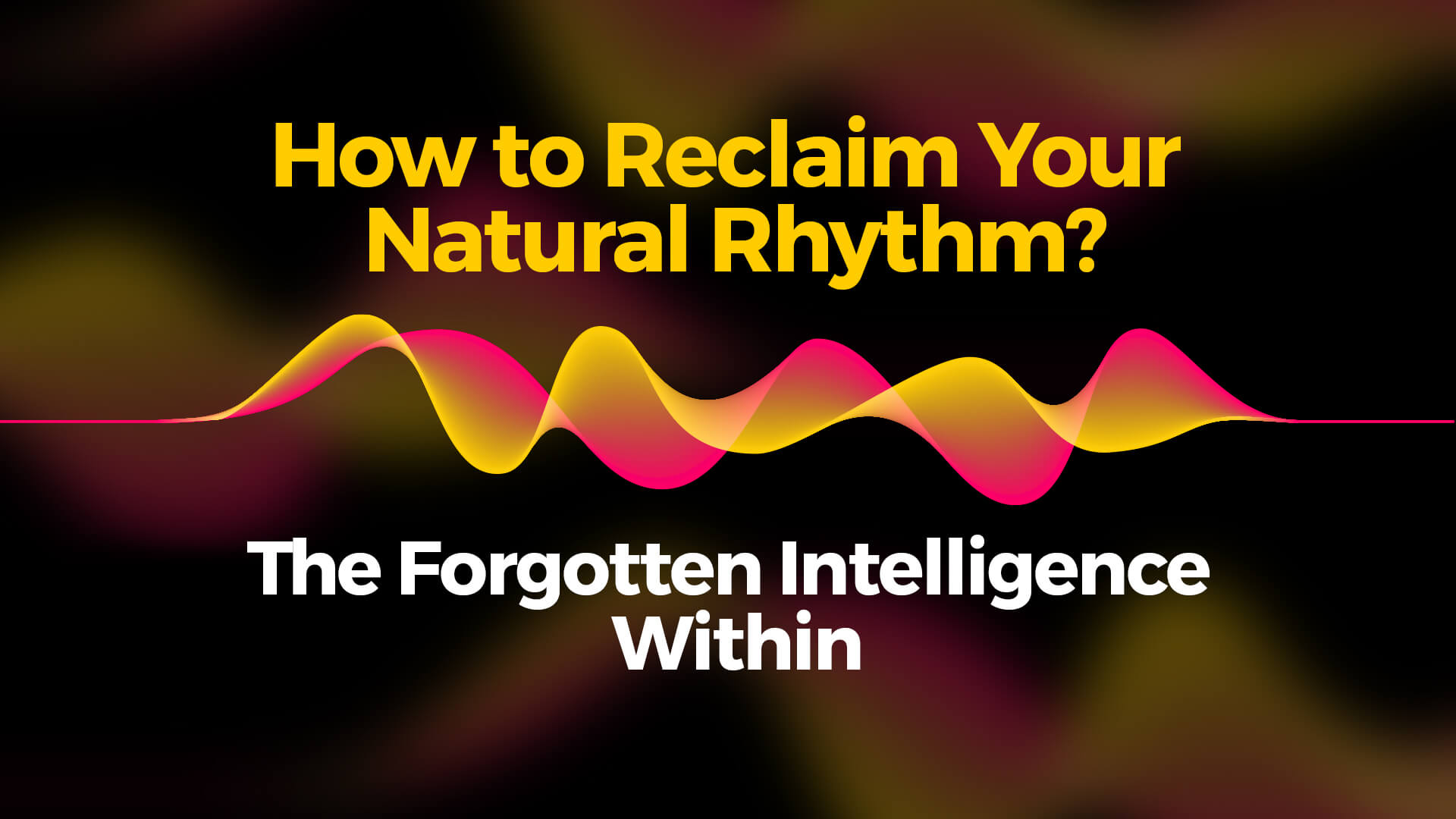Reconnect with your body’s wisdom and restore balance in a world that never stops
After over 15 years of working closely with people from all walks of life, entrepreneurs, homemakers, CEOs, and young founders, I have come to realise one universal truth: we are all silently yearning for alignment. Not success, not even rest, but alignment.
Somewhere along the journey of growing up, of becoming “adults,” we’ve forgotten how to listen to the most reliable compass we were ever given: our body. The body carries an ancient intelligence older than your business degree, deeper than your ambition, and more honest than your to-do list.
Your Body Knows the Rhythm
There is a rhythm in you that’s not made of alarms, schedules, or meetings. It’s not based on deadlines or calendar blocks. This rhythm is biological. Neurological. Hormonal. It’s the way your nervous system, muscles, and mind communicate with each other to keep you alive, balanced, and aware.
When you feel tired, it’s not weakness. It’s not laziness. It’s not poor discipline. It’s a signal. Your parasympathetic nervous system (which governs rest and recovery) is telling you, “Let go now, you’ve done enough.”
But we don’t. We push. We hustle. We look at the clock and ask, “Why am I tired already?” We feel guilty for needing a break. We have become strangers to our own rhythm.
This Is Not Alignment, It’s Disconnection
Most people I coach, whether they’re running a home or a company, are silently burning out. Not because they lack willpower or intelligence. But because they’ve been taught to override their body’s wisdom.
Instead of resting when exhausted, we caffeinate. Instead of slowing down, we speed up. Instead of breathing, we scroll.
We’ve trained ourselves to ignore the body’s messages in the name of performance, productivity, and social approval.
But this comes at a cost:
- Chronic fatigue
- Emotional numbness
- Mental fog
- Loss of joy
- Disconnection from self
We weren’t born this way.
Children know when to rest. They know when they’re done. They stop, they nap, they play, they cry, and then they move on.
This is not immaturity. This is biological intelligence.
The Science Behind the Sacred
Modern neuroscience has shown that our bodies have built-in systems to manage energy, focus, and recovery.
- Ultradian rhythms govern cycles of alertness and fatigue throughout the day.
- Circadian rhythms align us with the day-night cycle.
- Heart rate variability (HRV) is a measurable indicator of our ability to adapt and recover.
When you ignore these rhythms, your stress hormones stay elevated. Your digestion suffers. Your brain fogs. Your mood swings. Your immunity drops. But when you honour these rhythms, everything begins to recalibrate.
Rest Is Not Laziness. It’s Leadership.
Especially for high performers, whether you’re managing a home or a team, real leadership means recognising that alignment is more powerful than effort. A rested mind makes better decisions. A regulated nervous system leads with clarity. A connected body creates sustainable success.
This doesn’t mean abandoning your ambition. It means building a relationship with it that is sustainable, kind, and honest.
You Are Allowed to Stop. You Are Allowed to Heal.
Next time you feel tired, pause. Don’t argue with it. Don’t explain it away. Don’t wait for permission.
That pause is sacred. That pause is intelligent. That pause is alignment.
Underneath the layers of adult conditioning, the child in you is still there. Still whole. Still free. Still honest. Waiting for you to come back.
So take the nap. Close your eyes. Breathe deeply. Turn away from the noise and into your rhythm. Your body remembers. Let it lead.
Why We’ve Lost Our Natural Rhythm
This disconnection didn’t happen by accident. Several factors have systematically pulled us away from our natural rhythms:
Industrial Work Models
The typical workday wasn’t designed around human biology but around machine efficiency. The expectation to maintain consistent productivity throughout an 8-hour day contradicts our natural energy cycles.
Digital Overload
The average person checks their phone 96 times daily, once every 10 minutes, each notification triggering a small stress response that interrupts natural attention patterns.
Artificial Light
Evening exposure to blue light from screens disrupts melatonin production, delaying natural sleep onset by 90+ minutes according to research from Harvard Medical School.
Achievement Culture
We’ve absorbed the belief that productivity equals worth, making rest feel like laziness rather than a biological necessity.
7 Signs Your Body Is Asking For Reconnection
How do you know if you’ve become disconnected from your body’s intelligence? Look for these signals:
- You need caffeine to function in the morning and throughout the day
- You’re tired but wired at bedtime despite physical exhaustion
- Your energy crashes at predictable times, but you push through anyway
- Your hunger comes as extreme or barely noticeable
- You experience unexplained mood swings or emotional reactions
- Physical symptoms appear without obvious cause (headaches, digestive issues)
- You feel chronically behind despite working constantly
These aren’t personal failures; they’re your body’s attempt to communicate that something needs to change.
The Return to Body Intelligence
Reclaiming your natural rhythm isn’t about abandoning responsibility or productivity; it’s about aligning your life with your biology rather than fighting against it. Consider these research-backed approaches:
1. Honor Your Sleep Chronotype
“The best bridge between despair and hope is a good night’s sleep.” E. Joseph Cossman
Not everyone is meant to wake at the same time. Sleep researchers have identified distinct chronotypes (morning larks, night owls, and those in between) that reflect genetic differences in circadian rhythm.
Action step
For one week, allow yourself to sleep and wake without an alarm when possible. Note your natural patterns. Then adjust your schedule to honor your chronotype when feasible.
2. Create Energy-Based Schedules
Rather than scheduling based solely on time, consider scheduling based on energy. Research shows that most people have predictable windows of high focus, creativity, and analytical thinking.
Action step
Track your energy, focus, and mood at different times of day for one week. Then schedule your most demanding tasks during your natural peaks.
3. Practice Regular Nervous System Regulation
Your autonomic nervous system requires regular shifts between sympathetic (action-oriented) and parasympathetic (rest-and-digest) states for optimal function.
Action step
Incorporate five 3-minute breaks throughout your day focused on deep breathing (6 seconds inhale, 6 seconds exhale) to reset your nervous system.
4. Establish Consistent Eating Windows
Eating within a consistent 8-10 hour window each day supports your body’s metabolic rhythms according to research on time-restricted eating.
Action step
Experiment with limiting your eating to a consistent window (such as 9 am to 7 pm) to support metabolic health and energy regulation.
5. Create Technology Boundaries
Constant connectivity disrupts attention cycles and keeps stress hormones elevated.
Action step
Designate specific hours as “notification-free” zones, particularly during your first hour awake and last hour before sleep.
6. Cultivate Body Awareness
Many of us have become numb to physical sensations after years of ignoring them.
Action step
Practice a daily 5-minute body scan meditation, systematically bringing awareness to different body regions without judgment.
Practical Implementation: A Day Guided by Natural Rhythm
What might a day look like when aligned with your natural rhythm? Here’s an approach based on typical circadian patterns (adjustable to your unique chronotype):
Morning Alignment:
- Wake without an alarm when possible
- Expose yourself to natural sunlight within 30 minutes of waking
- Delay caffeine consumption for 90+ minutes after waking
- Schedule creative work during your natural morning focus window
Midday Recalibration:
- Honor hunger signals rather than eating by the clock
- Take a true lunch break away from screens
- Include a 10-15 minute post-lunch rest period (even a brief meditation)
- Recognize the natural afternoon energy dip (1-3 pm for many people)
Evening Restoration:
- Begin reducing blue light exposure 2-3 hours before bedtime
- Create a consistent wind-down ritual signaling sleep readiness
- Allow 7-9 hours for sleep opportunity
5 Deeper Benefits of Rhythm Reclamation
Beyond improved energy and productivity, reconnecting with your natural rhythm offers profound benefits:
- Enhanced Decision-Making
- Emotional Intelligence
- Intuitive Capacity
- Relationship Quality
- Sustainable Performance
A regulated nervous system accesses the prefrontal cortex more effectively, improving judgment and reducing impulsivity.
Regular connection with bodily sensations improves emotional awareness and regulation.
Many describe improved intuitive decision-making when they honor their natural rhythms.
Being present in your body allows for deeper, more authentic connections with others.
Rather than swinging between burnout and recovery, you can maintain consistent, sustainable output.
Common Obstacles and How to Address Them
“I don’t have time to listen to my body.”
This perspective reverses cause and effect. The time you “save” by overriding your body’s signals often returns as illness, reduced productivity, or recovery time. Research shows that preventive rest actually improves overall productivity.
“My work demands don’t allow for natural rhythms.”
While some constraints are real, most people have more flexibility than they realize. Start by identifying one meeting you could reschedule to a better energy time, or one break you could incorporate consistently.
“I’ve ignored my body’s signals for so long I can’t recognize them.”
Your body’s intelligence remains intact even after years of disconnection. Simple practices like hunger-fullness scales, emotion charting, and regular body scans can quickly rebuild awareness.
“Isn’t this just an excuse for laziness?”
Quite the opposite. Honoring your natural rhythm isn’t about doing less, it’s about matching your energy expenditure to your biological capacity, resulting in more sustainable output and reduced compensation patterns.
Reconnection Through Body-Based Practices
As Anne Lamott describes, “Almost everything will work again if you unplug it for a few minutes, including you.” Several established approaches specifically support reconnecting with natural rhythms.
Somatic Experiencing
Developed by trauma specialist Dr. Peter Levine, this approach helps restore nervous system regulation through gentle body awareness practices.
The Polyvagal Theory
Dr. Stephen Porges’ framework helps understand how our nervous system responds to safety and threat, with practical applications for regulation.
Mindfulness-Based Stress Reduction (MBSR)
This evidence-based program uses meditation and body awareness to restore attention to physical sensations.
Feldenkrais Method
Through gentle movement, this approach rebuilds awareness of habitual patterns and introduces new possibilities for movement and being.
Book Recommendations for Deeper Understanding
- “Why We Sleep” by Matthew Walker – Essential reading on the science of sleep and its impact on all aspects of health and performance.
- “The Body Keeps the Score” by Bessel van der Kolk – Explores how disconnection from bodily sensations impacts mental and physical well-being.
- “Burnout: The Secret to Unlocking the Stress Cycle” by Emily and Amelia Nagoski – Practical guidance on completing stress cycles rather than remaining chronically activated.
- “Rest: Why You Get More Done When You Work Less” by Alex Soojung-Kim Pang – Research-based approach to the productivity benefits of genuine rest.
- “The Rhythm of Life” by Matthew Kelly – Accessible framework for creating sustainable energy management in everyday life.
How Our Services Can Support Your Rhythm Reclamation
At Gateway of Healing, several of our offerings specifically support reconnection with your natural rhythm:
Chakra Balancing
This energy work helps identify and restore balance to energy centers that may be disrupted by chronic stress and disconnection.
Meditation Mindfulness
Learn practical techniques for daily nervous system regulation and enhanced body awareness.
Energy Detoxification
Release accumulated stress patterns that may be blocking your connection to natural bodily wisdom.
Life Coaching
Develop personalized strategies for honoring your natural rhythm within your unique life circumstances.
Access Bars
This gentle touch technique can help quiet mental chatter that often drowns out subtle body signals.
Your Invitation to Reconnection
Your body hasn’t forgotten how to guide you, and it’s simply waiting for you to listen again. The journey back to your natural rhythm begins with a simple question asked throughout your day: What does my body need right now?
This isn’t self-indulgence. It’s not weakness. It’s biological wisdom and the foundation for sustainable well-being.
We invite you to share your experiences with reclaiming your natural rhythm in the comments below. What signals have you noticed from your body? What happens when you honor them?
Looking for personalized support in reconnecting with your natural rhythm? Contact us to learn how our coaches and healers can help guide your journey back to alignment.
FAQ: Reclaiming Your Natural Rhythm
Q: How long does it take to reconnect with natural rhythms?
A: Most people notice improvements within 1-2 weeks of consistent practice. Full recalibration, particularly for sleep cycles, may take 2-3 months.
Q: Can I still be productive if I honor my natural rhythms?
A: Research suggests you’ll likely be more productive overall, though your productivity may shift to different times than you’re accustomed to. Honoring your body’s natural high-energy windows can significantly increase quality output.
Q: How do I handle social expectations that conflict with my natural rhythm?
A: Start with small boundaries where possible (like declining early morning meetings if you’re a night owl). Educate those close to you about your process. Remember that your increased presence and energy when in alignment will benefit your relationships.
Q: Is it possible to change your chronotype?
A: While there’s some flexibility, your basic chronotype is largely genetically determined. Rather than fighting your natural pattern, focus on adjusting your environment and schedule when possible.
Q: What if my job requires shift work that disrupts circadian rhythms?
A: Shift work creates genuine challenges for body rhythms. Focus on consistent sleep timing within each schedule block, strategic light exposure, and careful attention to nutrition timing to minimize disruption.
Reach Dr. Chandni’s support team at +918800006786 and book an appointment.


































